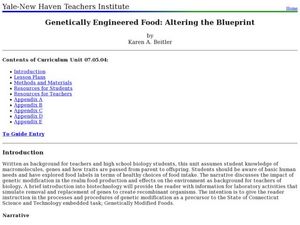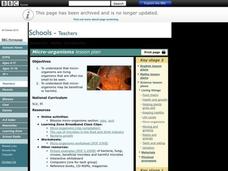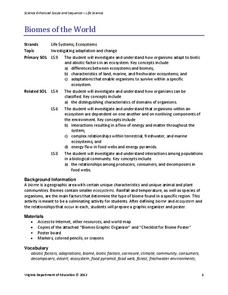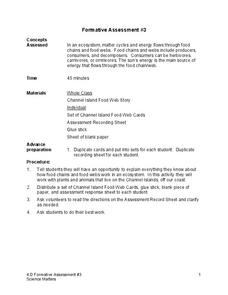Curated OER
Graphing the Annual Food Drive
Learners graph the number of items contributed to the food drive. They compare daily results to other days or to an overall goal and answer questions based on the graph.
Curated OER
The Food Chain Game - A Lesson in Ecosystems
Students are divided into three groups, herbivores, omnivores, and carnivores which receive a certain number of lives. Once in their ecosystem (outside or the gym), the carnivores chase and eat either the herbivores or omnivores, the...
Curated OER
Genetically Engineered Food: Altering the Blueprint
Students explore the genetic engineering of food. In this health lesson plan students explain how DNA technology can be used to produce food.
Curated OER
Major Organic Acids in Fruits
Students investigate the organic acids present in a variety of juices. In this organic acids lesson plan, students read about the effects of organic acids in juices. They use paper chromatography to separate out the acids present in a...
Curated OER
Micro-Organisms
Students investigate microscopic life by viewing video clips. In this organisms activity, students view photographs and video clips on the internet of micro-organisms and discuss the harms and benefits of the creatures. ...
Curated OER
Food Spider Map: Graphic Organizer
In this food spider map worksheet, students utilize a food spider map graphic organizer to plan their report or project about food. Students list eight facts about food on the lines provided.
Curated OER
How Does Energy Flow in a Food Web?
In this food web worksheet, students will write down the 4 steps energy takes as it flows through a food chain. This worksheet is a graphic organizer.
Curated OER
The Flow of Energy Through a Food Chain
In this food chain worksheet, students write in the steps that show how energy flows through a food chain, from producers to consumers. This worksheet is a graphic organizer.
Curated OER
Chapter 16, Food Biotechnology
Although the points given on these slides are valid, the visual accessibility is poor. Consequently, many viewers would be distracted or entirely unable to view the presentation. The content is a review of microorganisms and their...
Polar Trec
Arctic Smorgasbord!
Two blooms of phytoplankton, instead of just one, now occur in the Arctic due to declining sea ice, which will have widespread effects on the marine life and climate. In small groups, participants build an Arctic food web with given...
Howard Hughes Medical Institute
Modeling Trophic Cascades
In the ecological game of who eats who, one small change can have a big impact! Individuals create food chains in an array of ecosystems, then determine what happens to organisms in the chain when one organism changes its feeding...
Virginia Department of Education
Biomes of the World
Incorporate knowledge about biomes and ecosystems in multiple ways while encouraging creativity. Emerging ecologists collaborate and perform research to complete a graphic organizer about various biomes of the world. They conclude the...
August House
Go to Sleep, Gecko
Use this multidisciplinary lesson to delve into these subjects: English language arts, math, science, drama, and character education. After reading, discussing, and making interpretations about Go To Sleep, Gecko!: A Balinese...
Curated OER
Paragraph Structure
Make sure your writers have the buns and the meat in their paragraph burgers with paragraph exercises. The resource gradually leads up to individuals writing their own paragraphs, starting with identification exercises, moving on to...
Ask a Biologist
It’s a Plankton Eat Plankton World
For as small as they are, plankton sure play an enormous role in maintaining marine ecosystems. Dive into an investigation of these tiny organisms with a hands-on life science activity in which children cut out pictures of sea...
New South Wales Department of Education
The Mangroves
Mangroves are a nursery for a variety salt-water organisms. Learners explore the mangrove ecosystem through audio, video, and/or images, to see the organisms that live in this environment and make food chains pertaining to this...
National Park Service
Fitting In
Birds help other birds find food? Scholars are placed into one of five groups of different birds. Each group then "feeds" on letters of paper in a field and gather five pieces per person. As each group plays, more food is exposed,...
Howard Hughes Medical Institute
Building Ecological Pyramids
Looking for a fresh take on traditional food/energy pyramids? Conduct an innovative activity where pupils build their own! The lesson uses research data from Gorongosa National Park in Mozambique for a real-life safari touch. Scholars...
Science Matters
Formative Assessment #3
Thirteen short-answer questions follow a brief food web activity in a formative assessment designed to test knowledge of ecosystems and the energy that flows through them.
Cooking Matters
Happy Whole-idays
Take a look into how whole grains support growth, provide energy to play, and help us to stay strong with a fun-filled resource. The worksheet offers interesting food facts, an exercise in nutrition label reading, a recipe...
NOAA
Deep-Sea Ecosystems – Life is Weird!
A pool of brine in the deep sea can be up to four times as salty as the surrounding sea water. The deep sea ecosystem relies on chemosynthesis and the organisms that live there are often strange to us. The lesson focuses on researching...
NOAA
Animals of the Fire Ice
When the sun's rays can't reach the producers in a food web, where does all the energy come from? Extreme environments call for extreme food sources. Young scientists investigate creatures that appear to get their energy from methane...
Michigan State University
In Search of Life
Explore the habitats around you with an activity that takes kids out of the classroom to learn about the local variety of habitats and the living things that call them home. In small groups, scholars investigate their surroundings,...
Curated OER
My Colorful Food Chain
Students explore biology by participating in a dietary habit activity. In this food chain lesson, students discuss their own diets and the animals we feed upon daily. Students create a poster demonstrating the animals that we feed upon...
Other popular searches
- Organic Food and Nutrition
- Con Pair Organic Foods
- Organic Foods Taste
- Non Organic Foods
- Com Pair Organic Foods
- California Organic Foods
- Compair Organic Foods
- Conpair Organic Foods
- Organic Foods Lesson Plan
- Organic Food Project
- Organic Matter Food Tests























